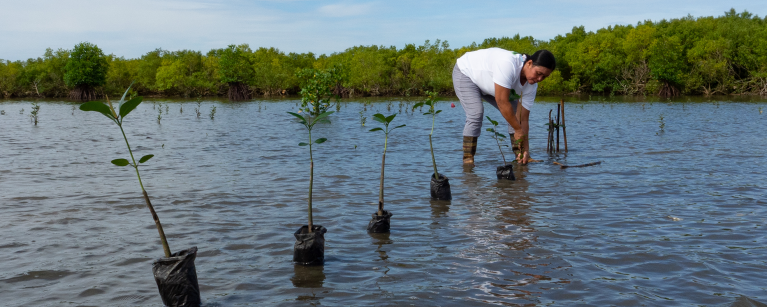Oxfam in Asia statement on the launch of Asian Development Bank’s IF-CAP
May 4, 2023 (Incheon) – The Asian Development Bank unveiled a new flagship initiative called Innovative Finance Facility for Climate in Asia and the Pacific (IF-CAP). Announced during the bank’s ongoing 56th annual meeting in Incheon, Korea, the IF-CAP is a multi-donor facility that provides guarantees for parts of the Bank’s sovereign portfolios to enable it to free up capital and increase loans for climate investment.
The ADB profiles itself as the climate bank of Asia and the Pacific, and despite its stated commitment towards climate adaptation, its financing mechanism of choice continues to be loans.
The 2022 analysis from Oxfam exposed that non-concessional debt instruments dominate ADB’s climate portfolio which constituted 82% ($20.3 bn) of its mobilization between 2013 – 2020. Concessional debt instruments make just 12% ($2.9 bn) in contrast. Only 3% of its climate portfolio is delivered in grant form ($0.7bn). The remaining 3% is delivered through non-concessional equity investment ($0.8bn).
Further, the bank’s priorities do not match the adaptation needs of its member states to deal with climate impacts. Between 2013 – 2020, $3.965bn was mobilized for dealing with climate impacts and of that only $0.787 bn could be considered grant equivalent financing.
The ADB aims to create up to $15 billion in new loans by mobilizing $3 billion in guarantees through the IF-CAP. The bank claimed that the facility is ‘a first ever leveraged guarantee mechanism for climate finance’ adopted by a multilateral development bank. IF-CAP aims to support projects to reduce greenhouse gas emissions and for adaptation to building resilience to the impacts of climate change in its developing country members.
Initiatives like IF-CAP add to peoples suffering as the recipient countries will have to pay back where the Asian countries are already forced to spend 16 times more in debt servicing compared to climate change adaptation. Pushing loans to poorer countries battling climate crisis will trap them into further debt burden as the investments in tackling climate crisis can’t yield a return to pay back loans.
There is evidence that loans as an instrument for climate finance accumulate further debt burden, resulting in a reduction of fiscal space of developing countries further undermining their ability to invest in critical development goals, which only exacerbates their vulnerability to climate impacts. The glaring example is that of the Pakistan floods in 2022, where the World Bank and ADB are pushing more debt while the country is struggling to pay off its previous debt.
Calling climate loans innovative is just masking up efforts to return more profits for the lenders and increasing suffering for the borrowers. ADB’s credibility to be the climate bank of Asia is questionable when it is pushing more loans for countries and people which didn’t cause the crisis in the first place. It is a deep climate injustice.
Oxfam International’s report 'Climate finance in Asia: Assessing the state of climate finance’ released in 2022, revealed that the climate finance provided to Asia is woefully inadequate to support the necessary adaptation actions and vulnerable communities are suffering as a result.
Sunil Acharya, Regional Policy, and Campaigns Coordinator, Oxfam International – Asia is currently in Incheon for Asian Development Bank’s 56th annual meeting (2 – 5 May 2023).
For more information, please contact, Asia media and communication lead, Himanshi Matta, Himanshi.matta@oxfaminternational.org
